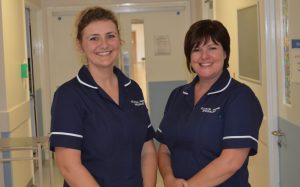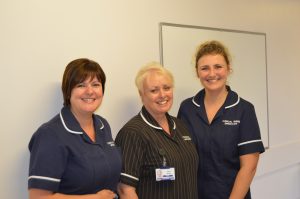
Jenny McDonald, Clinical Nurse Specialist for Acute Pain, with Lisa Doughty, Nurse Specialist Lead for Acute Pain
Patients who experience acute pain after an operation can now go home much sooner thanks to a highly committed team from Blackpool Teaching Hospitals.
The Acute Pain Team is responsible for educating hospital staff in dealing with patients in pain, monitoring specialised pain management techniques and intervening in the management of severe pain for patients that can’t be managed by non-specialised teams within the Trust.
We are celebrating the work of this team on Fab Change Day (October 19) as the members of staff are making positive changes for patients.
Dr Andy Ng is the Lead Consultant Anaesthetist for acute pain, Lisa Doughty is the Lead Nurse Specialist for Acute Pain and Angela Nield and Jenny McDonald are Clinical Nurse Specialists with the team.
Paula Vernon, the Clinical Matron who manages the Acute Pain Nurse Specialists, said: “The anaesthetists will plan to manage the patient’s pain post operatively by prescribing painkillers or initiating a specialised pain management technique.
“The nursing team will ensure the technique is effective and monitor any manage any unwanted side effects.

Jenny McDonald, Clinical Nurse Specialist for Acute Pain (right), with Lisa Doughty, Nurse Specialist Lead for Acute Pain and Clinical Matron, Paula Vernon (centre)
“Although pain is predictable after an operation, there can be times when the medication or technique requires changes to aid its effectiveness. The nursing team will manage this to ensure patients are able to participate with physiotherapy. All monitoring is audited and the team benchmark their service with other acute pain services around the United Kingdom.”
Although the nursing team has changed since it was started in the early 1990s, the team’s approach has been to strive for safe and effective management of post-operative pain.
In recent times there has been a move to get patients home sooner after operations so the team works collaboratively with the patient and wider team of nurses, doctors, physiotherapists to achieve this.
Paula said: “Although surgical techniques have improved the patients require analgesia to aid their recovery.
“High doses of pain medication are often required to assist in patients’ early mobilisation and early discharge.
“The key to being able to send patients home sooner is making sure they were well prepared.
“If a patient is going home with high dose painkillers, the acute pain service give patients support and advice so that the patient understands when and how to reduce them. For patients on very high dose pain medication or who have had problems after surgery, there can be a requirement to monitor any reduction of medication more closely.”
Two systems have been set up to help patients have an earlier discharge from hospital.
The first is that the Acute Pain Team maintains telephone contact with the patient to support them reducing their pain medications as prescribed. This prevents delayed discharge or more frequent hospital appointments.
Patients with more complex pain medications or pre-existing conditions are reviewed by Dr Andy Ng in an Outpatients’ setting where both the patient and the prescription can be monitored and adjusted accordingly.
Paula added: “If patients are unable to reduce pain medications they are signposted to the Chronic Pain Team for longer term management.
“The team has also introduced a ‘rectus shield block’ where a local anaesthetic helps to reduce the patient’s pain experience, reduce stronger opiate pain medications, improve mobilisation/patient compliance with physiotherapy and have less side effects when compared to invasive techniques such as epidurals.
“It is proving very useful for patients on the enhanced recovery programme.
“The acute pain service works collaboratively with other teams to ensure patients are managed safely but do not have repeated visits from many specialist teams where they have to repeat their history or symptoms.
“Through working together and communicating well with each other, patients can be managed safely. Ultimately the team can treat more patients and improve patient experience.”
